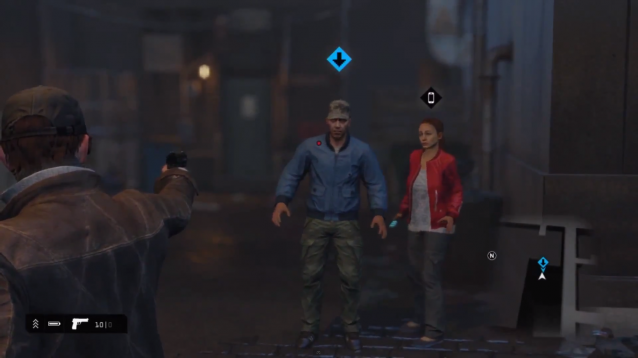

Short Version: Alan Wake delivers an intense, atmospheric and highly cinematic action experience. The solid combat mechanics are backed up by a fantastic story, colorful characters and eye popping visuals.
Game Rant’s Tom Copeland reviews Alan Wake
It’s been five long years since Remedy Entertainment first teased Alan Wake at E3 2005. Since then, the gaming landscape has shifted considerably; Both technically and narratively. But has Alan Wake managed to keep up with these developments and live up to the hype? In a word – yes.
The narrative in Alan Wake is vital to the experience, so with the best interests of the reader in mind I will be keeping this review relatively spoiler free. I will only be discussing elements that won’t hamper your enjoyment of the game in any way. To do otherwise would be a great injustice to a fantastic game Remedy have crafted.
Touted by Remedy as a psychological action-thriller, Alan Wake puts the player in the shoes of, well, Alan Wake. Wake is a popular fiction writer who is suffering from a serious case of writers block, meaning he hasn’t written a single word in the past two years. His wife Alice suggests that they take a vacation to the idyllic small town of Bright Falls. Shortly after arriving at their log cabin, things take a turn for a worse. Alan wakes up behind the wheel of a crashed car with no recollection of how he got there, and Alice is missing. So begins his search for his wife and his battle against the darkness residing in Bright Falls.
Remedy has done a stellar job with the storytelling in Alan Wake. There is no filler here. Max Payne scribe Sam Lake has provided an extremely tight and well-written narrative that expertly weaves elements of action, horror, mystery and even a dash comedy together to form a completely mesmerizing story that kept me hooked from start to finish. As far as videogame stories go, it’s up there with the best of them.
The narrative is presented like a television show; Remedy has divided the story into six ‘episodes’ Each constantly developing the narrative in a compelling way, serving up just enough answers to keep you satisfied while leaving you constantly wanting more. Every episode feels like a standalone experience, not just a chunk of a bigger game that’s been divided randomly. My only wish is that Remedy took the premise one step further by adding fictional credits at the end of every episode instead of the message that reads “End of Episode X.”
While I’m on the subject of television, it’s extremely apparent that Wake wears its influences on its sleeve; the town of Bright Falls is unabashedly similar to Twin Peaks, while Lost fans will recognize that the Dark Presence bares more than passing resemblance to old Smokie. The game is loaded with pop-culture references that not only serve to entertain but further reinforce that this story is based somewhat in our reality.
The gameplay of Wake can boiled down to that of a third person shooter, albeit an extremely competent one. Alan is battling the Dark Presence, a force that manifests itself in a number of ways, the most frequent of which is The Taken – shadow figures that were once the inhabitants of Bright Falls, who now attack Alan with axes, sickles and various other sharp implements.
Light plays an integral role in Alan Wake. Before The Taken can be damaged with firearms, Alan needs to burn away the darkness protecting them. A task he achieves with his trusty flash light, which is perhaps the most important item in the entire game. However, torches are not magically powered and you will need to find extra batteries if you wish to optimize the full potential of the light.
The combat is extremely satisfying and the inclusion of the light mechanic helps to make Wake feel fresh in a somewhat tired & overpopulated genre. The controls are refined, meaning controlling Alan is fast and responsive. The aiming is so tight and accurate that I rarely misplaced a shot. It just feels right. Unfortunately, I found that the combat became repetitive during some prolonged sections. In particular, the woodland segments felt like they could have been shortened a little to keep the momentum up.
When Wake was first demoed in 2005, Remedy showcased it as an open world game that would allow the player freedom to experience the story at their own pace. Five years down the line none of the open world idea remains. In fact, Alan Wake is now an extremely linear experience. You are pretty much always moving from point A to B with very little room for exploration. Don’t mistake that for a flaw though, as the restrictions in the world allow Remedy to script the action perfectly, always making sure you are in the heart of the action, or never too far away from the next heart-pounding set piece.
Continue to Page 2 of Game Rant’s Alan Wake review!
Continued:
« 1 2 »




 PlayStation 4: Its Not For Girls
PlayStation 4: Its Not For Girls Dark Souls 2 Merchant Guide
Dark Souls 2 Merchant Guide WWE SuperCard (Android) Quick Tips
WWE SuperCard (Android) Quick Tips Halo 5: Guardian Complete Walkthrough and Guide
Halo 5: Guardian Complete Walkthrough and Guide 2 Best Ways To Disable Chromebook Sleep Mode
2 Best Ways To Disable Chromebook Sleep Mode